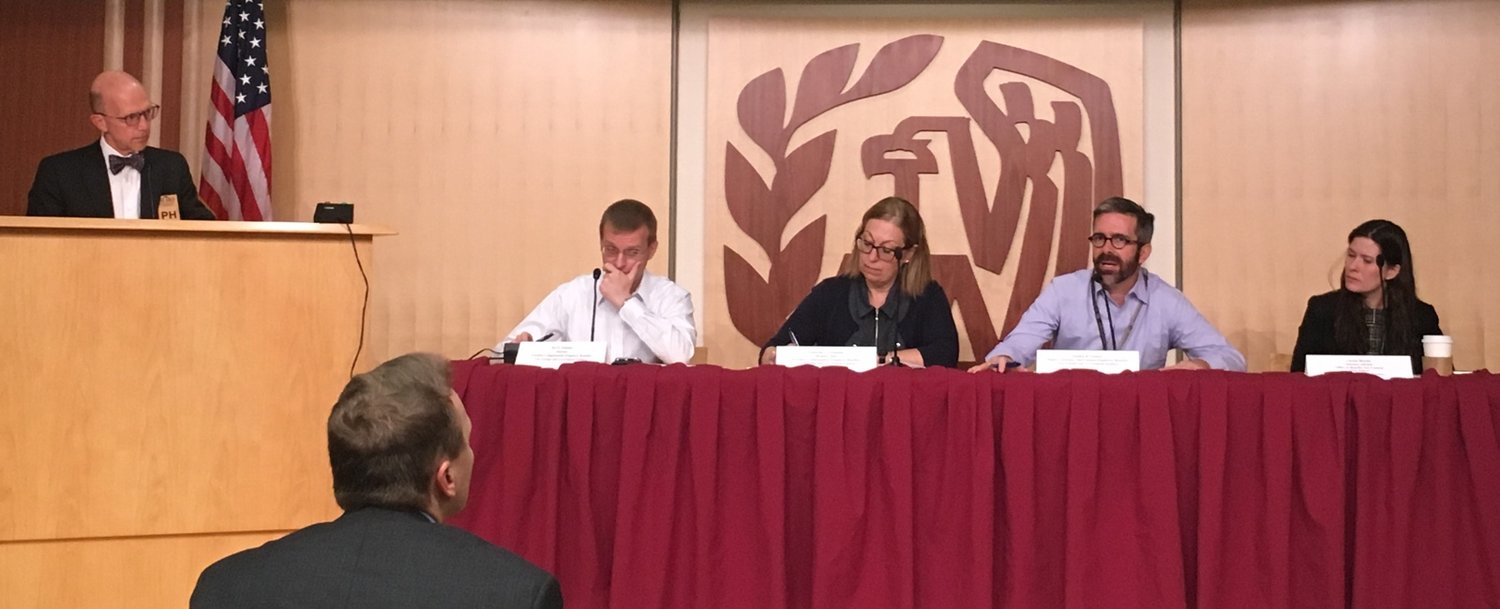October 19, 2016 Kirk and Jim present at IRS hearing
 Yesterday Kirk Sherman and Jim Patterson presented their comments to an IRS panel on the proposed regulations to 26 U.S.C. § 457(f). They were the only two scheduled speakers on the agenda.
Yesterday Kirk Sherman and Jim Patterson presented their comments to an IRS panel on the proposed regulations to 26 U.S.C. § 457(f). They were the only two scheduled speakers on the agenda.
Read brief summaries from BNA and Tax Analysts, or the full transcript of the hearing from Tax Analysts.
 Here are some highlights from the hearing:
Here are some highlights from the hearing:
On elective vesting dates and Flexible Benefit Plans
Kirk questioned if and how the proposed elective deferral rules (e.g., >125% present value standard and minimum two-year deferral period) would apply to plans that allow participants to elect the vesting date and to elections under Flexible Benefit Plans. The IRS stated its intent that the elective deferral rules apply in both cases. Kirk suggested revisions to the proposed regulations that would make this clearer.
On applying the elective deferral rules to supplemental deferrals
Kirk presented a typical plan design with annual employer contributions that vest at age 65 and stated that some argue the elective deferral rules apply. If the elective deferral rules apply, the employer contributions from age 63 to age 65 would be taxed upon contribution because they would fail the two-year minimum deferral rule. Kirk pointed out that in the absence of a deferral election, the two-year minimum should not apply and would make plans unnecessarily difficult to administer.
MR. TACKNEY: I can see where the confusion lies and, in fact, I think that’s something we may need to address more clearly in the regulations.
On exemption from loan regime split dollar
Kirk explained the high value of the express exemption from the 409A rules for loan regime split dollar and asked for a similar exemption from the 457(f) rules.
On non-compete restrictions
Kirk explained that non-competes are valuable to employers to protect against unfair competition, and that noncompete restrictions in deferral plans provide the “single most efficient way to protect the employer from … unfair competition.” He also highlighted that competition often has little to do with money, but increased responsibilities and prestige. Moreover, using the employee’s “financial need” as one of the factors to determine if the noncompete passes the new higher IRS bar creates problems of privacy (who is going to evaluate the employee’s finances?) and standards (how is need determined?). Kirk therefore asked the IRS to remove the “financial need” criteria.
MR. TACKNEY: I guess it’s interesting. Where we’ve seen a lot of cases is not at the CEO level. It is at lower levels where non-competes were being basically signed off on, not followed, not used, and we were wondering whether the fact that these were mid-level people without significant benefits, retirement type benefits are being eligible for payments under them would be a significant factor in thinking this person may need to go compete … as opposed to someone who is truly retiring at a higher level. So I think that’s where we were coming from in our experience with cases we’ve seen which had, basically, blanket non-competes with choice of term … That’s why we were trying to come up with something that at least took into account if you really know these people are going to need to continue their career, probably need to continue their career, you know, unless they’re otherwise independently wealthy … I think we’re coming at it from two different experiences. But I do agree we may need, especially that what we intended was limiting it to the types of information that employer would otherwise know. I don’t think we intended for people, and we have gotten this question, that really have to sit down and discuss peoples’ personal financial information.
On grandfathering prior deferrals
Jim had interesting back and forths about the treatment of prior deferrals under the new rules:
MR. TACKNEY: [Prior deferrals] won’t be subject to the final regs for years prior to the years the final regs are published. So they won’t be retroactive to open years and cause you to have – you know, on the other hand, as of 2017 the way this would read, if that’s when we go final, all your amounts deferred, no matter when deferred that you haven’t otherwise included in income, if they are vested under the final rules would be vested in 2017 and need to be included in income.
MR. PATTERSON: [W]e think the law in effect at the time of deferrals should control. Retroactive tax law creates unfairness for tax payers who made decisions based on the law and guidance at the time.
MR. TACKNEY: But then wouldn’t they have had – our position would have been they had income inclusion all along on their no match elective deferrals and then you can just implement your match.
MR. PATTERSON: And you’re saying that’s been the position of the Service for decades?
MR. TACKNEY: Well, it certainly has been for the last decade.
MR. PATTERSON: [T]hat’s an area where perhaps we have a different view on what the Service felt in looking at private letter rulings, in looking at just – I don’t know, client audit experience, where they looked at that specific issue. But specifically letter rulings and practices where elective deferrals were allowed. Court cases addressed those. [T]hose are things that we’ve relied on in our practice.
On timing of complying with new regulations
MR. ENKISHEV: What’s the typical timeline for that? From the – you mentioned the process, from the beginning to the end, is it nine months, six months?
MR. PATTERSON: It’s more than six weeks or four weeks. I don’t know. It depends on the size of the organization, the complexity of the benefit plans, the situation. It is different for each organization. But I would say for no organization, would say four weeks would be sufficient. I don’t even know that most boards meet within that period of time. So if the Service finalized regs at Thanksgiving for them to take effect, five weeks later would be very difficult.
Following pushback from the IRS on more time for documentation compliance
MR. PATTERSON: I understand your point. Perhaps the better request from us would be give more time for operational and documentation compliance (laughter) to make them occur at the same time. I understand the point you’re raising. By dividing out operational compliance and documentation compliance I’m just trying to point to the practical realities that companies can do what you’re asking them to do.
MR. TACKNEY: … So I can understand where you are not one of the more aggressive players and you just want to bring things – maybe you need to make some slight modifications … But I think your points are well taken, especially for those less aggressive and folk just trying to follow the rules.
Arguing severance plans with potential offsets should be treated differently
MR. PATTERSON: I understand the point that you’re making there. What we would recommend is that the IRS clarify in the regulations that the portion of the severance that is subject to the offset not be taxable until it’s actually paid, assuming the bona fide severance plan exemption does not apply … [W]e look at it not just from the participant standpoint, as you are, but from the employer standpoint. And the ability to provide competitive severance, to be able to have the right people doing the right things for the organization, we think that there is merit to that.
We care about the protection of your data. Read our